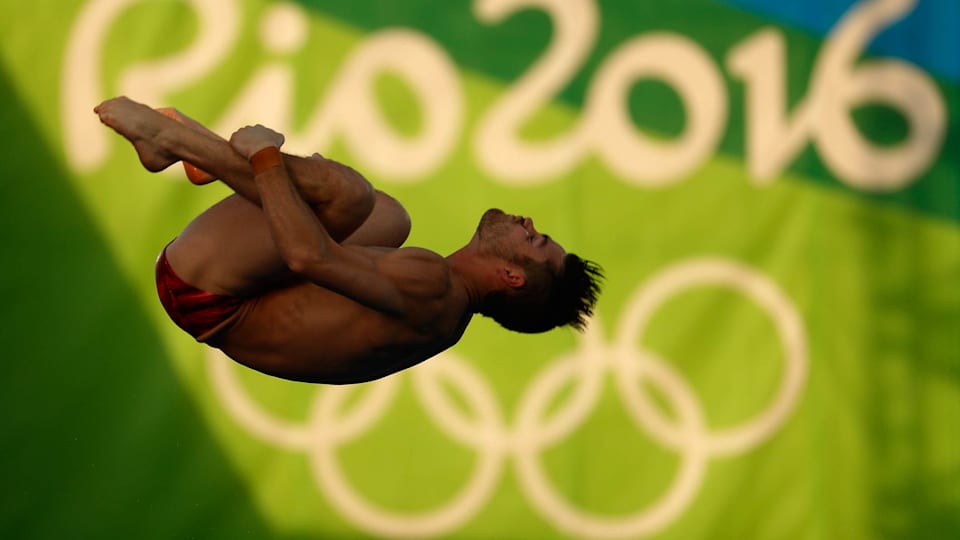David Boudia’s journey to gold wasn’t just a physical battle - it was a mental one too
As a seven-year-old gymnast, he remembers watching his first Olympic Games, Atlanta 1996, and dreaming of competing on the world stage. It wasn’t long before he transitioned into diving, a sport which would later see him winning a gold medal at the London 2012 Olympics and would also play a vital part in his battle with depression.

To reach our full potential, we have to dream big but having such high expectations of ourselves can come at a cost. The pressure to achieve can be crippling and in the moments we don’t succeed, being too critical of ourselves can cause us to spiral into depression. If this sounds familiar, then you’re not alone; around one in five young Americans now struggle with their mental health.
Boudia experienced this first-hand. From a young age, he was always driven by what he now feels were superficial goals; fame, riches and notoriety. But he wasn’t prepared for the impact that achieving this would have on his mental health and the deep depression that would accompany his new-found success.
The Journey to the Top
At the age of 11, in suburban Indianapolis, Boudia’s ambitions began to take shape as he worked towards becoming a top athlete. Growing up, he enjoyed a normal childhood in the Midwest. His family, who were already Olympics fanatics, were a strong support system whose work ethic inspired him to aim high. His father would make him pre-training breakfast at 6am each day and his mother would drive him to the pool for practice. Despite the encouragement from his parents, he was always very independent, wanting to figure everything out on his own - but it soon became apparent that this way of living was detrimental.
I wanted to succeed and achieve the dream that I had, and I spent hours thinking about how I could get that done. David Boudia - David Boudia
Treading Water
Boudia’s mental health began to deteriorate after representing the United States at the Olympics when he was just 19. Being at the Games was a rollercoaster that saw him experience the highs of competing among the world’s top athletes contrasted with days when he felt inexplicably low. To everyone else, it seemed as if he had it all. But concentrating all of his efforts on the fleeting goal of winning was damaging to his mental health.
The summer before he began his sophomore year at Purdue University, he became more and more depressed. Just weeks before, he’d been rubbing shoulders with the elite U.S Olympic team, achieving the goals he’d set for himself as a child and now he was walking through campus like everyone else.
“The lights turned out and it was like I was this average Joe again,”
At its worst, depression can be debilitating; Boudia struggled to get out of bed and avoided talking to his friends or going to class and practice. “I wanted to just lay in bed and not think about anything - to the point where it got so bad that I contemplated suicide.” It was at this point that Boudia knew he needed help.
“What’s the purpose? Why am I here? What am I doing? What’s the point in all of this?”
The Journey to Success
If Boudia could offer any advice to his younger self for getting back on track mentally, it would be to open up. His first step back to Olympic diving began by simply communicating that he was struggling to his coach, Adam, and Boudia’s now wife of 10 years, Sonnie Brand.
Being open and honest about how he felt allowed him to begin the process of recovery, step by step. That included recognising that success is as much about the end goal as it is about the journey and learning to enjoy it by not worrying about what he can’t control along the way. Throughout this process, he has also learned the importance of finding a balance between work and life to avoid burning out again.
This advice is something that Boudia has had to draw on again since recovering from depression because, as he discovered, life isn’t a linear journey. After his third Olympics in Rio 2016, Boudia suffered a concussion whilst diving off a 10m platform, forcing him to re-evaluate his discipline and ultimately choose to leave his 10m platform career behind and pursue the 3m springboard for Tokyo.
“value the journey and not just the medal you might win”
Boudia’s experience isn’t uncommon - in the last two decades, the suicide rate among people aged 10 to 24 has increased dramatically by over 50%. According to a report from the Centers for Disease Control and Prevention, it’s now the second leading cause of death among young Americans. It’s more important than ever that we talk about how we feel and seek advice from those around us.
If you are struggling with your mental health, it often feels as though there is no one you can trust to confide in, but from Boudia’s experience, just getting your emotions out and letting go of the expectations of your life’s journey is the best step you can take.
